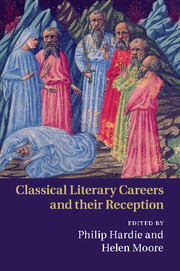Book contents
- Frontmatter
- Contents
- List of contributors
- Preface
- Note on the text
- Introduction: Literary careers – Classical models and their receptions
- 1 Some Virgilian unities
- 2 There and back again: Horace's poetic career
- 3 The Ovidian career model: Ovid, Gallus, Apuleius, Boccaccio
- 4 An elegist's career: from Cynthia to Cornelia
- 5 Persona and satiric career in Juvenal
- 6 The indistinct literary careers of Cicero and Pliny the Younger
- 7 Re-inventing Virgil's Wheel: the poet and his work from Dante to Petrarch
- 8 Did Shakespeare have a literary career?
- 9 New spins on old rotas: Virgil, Ovid, Milton
- 10 Bookburning and the poetic deathbed: the legacy of Virgil
- 11 Literary afterlives: metempsychosis from Ennius to Jorge Luis Borges
- 12 ‘Mirrored doubles’: Andrew Marvell, the remaking of poetry and the poet's career
- 13 Dryden and the complete career
- 14 Goethe's elegiac sabbatical
- 15 Wordsworth's career prospects: ‘peculiar language’ and public epigraphs
- Epilogue: Inventing a life – a personal view of literary careers
- List of works cited
- Index
10 - Bookburning and the poetic deathbed: the legacy of Virgil
Published online by Cambridge University Press: 10 November 2010
- Frontmatter
- Contents
- List of contributors
- Preface
- Note on the text
- Introduction: Literary careers – Classical models and their receptions
- 1 Some Virgilian unities
- 2 There and back again: Horace's poetic career
- 3 The Ovidian career model: Ovid, Gallus, Apuleius, Boccaccio
- 4 An elegist's career: from Cynthia to Cornelia
- 5 Persona and satiric career in Juvenal
- 6 The indistinct literary careers of Cicero and Pliny the Younger
- 7 Re-inventing Virgil's Wheel: the poet and his work from Dante to Petrarch
- 8 Did Shakespeare have a literary career?
- 9 New spins on old rotas: Virgil, Ovid, Milton
- 10 Bookburning and the poetic deathbed: the legacy of Virgil
- 11 Literary afterlives: metempsychosis from Ennius to Jorge Luis Borges
- 12 ‘Mirrored doubles’: Andrew Marvell, the remaking of poetry and the poet's career
- 13 Dryden and the complete career
- 14 Goethe's elegiac sabbatical
- 15 Wordsworth's career prospects: ‘peculiar language’ and public epigraphs
- Epilogue: Inventing a life – a personal view of literary careers
- List of works cited
- Index
Summary
Life imitates Art far more than Art imitates Life.
Oscar Wilde, Intentions
The Virgilian tradition preserves three problematic and somewhat contradictory sets of testimonia about Virgil's role in framing his own corpus as a ‘career’. On the one hand, there are the passages where Virgil himself clearly marks his own progression from Eclogues to Georgics to Aeneid. These include instances of self-quotation (Ecl. 5.85–7; Geo. 4.566) and promises of future work in higher style (Ecl. 8.6–13, Geo. 3.46–8) as well as less explicit passages whose imagery is now interpreted as foreshadowing the pastoral–didactic–epic progression – for example, the closing lines of Eclogues 1 and 10 often read as a transition to the harsher world of the Georgics. Reinforcing and completing these internal signposts are two pseudo-Virgilian texts. First, there is Virgil's supposedly self-composed ‘epitaph’, which neatly concludes cecini pascua rura duces (‘I sang pastures, farms, and war-leaders’). The other passage is the famous ille ego prologue which, according to Servius and Donatus, originally opened the Aeneid. It offers a brief literary biography of the poet: first I composed with a ‘slender reed’ (gracili … auena); then I left the woods and produced a work ‘pleasing to farmers’ (gratum opus agricolis), ‘but now’ (at nunc) I sing of arms and the man. The potent combination of Virgil's own statements, the pseudepigraphical additions, and the canonization of the Aeneid quickly transformed the Virgilian corpus into a poetic version of the cursus honorum.
- Type
- Chapter
- Information
- Classical Literary Careers and their Reception , pp. 197 - 208Publisher: Cambridge University PressPrint publication year: 2010
- 7
- Cited by



